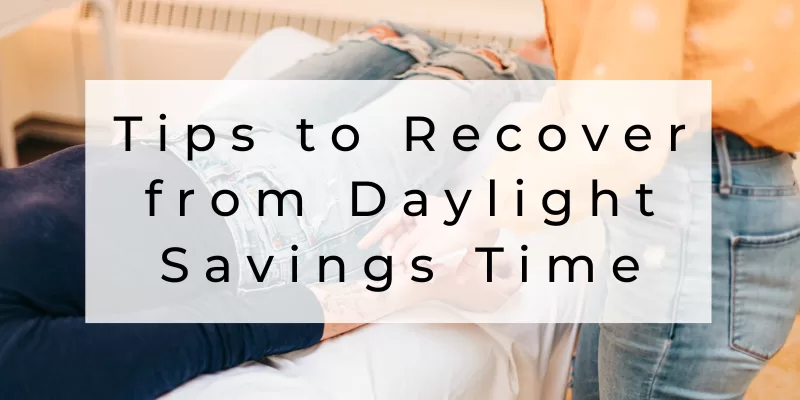
Does Daylight Savings Time throw your body for a loop?
You’re not alone. Every year, patients tell us they feel:
- – Exhausted
- – Hungry at odd times during the day
- – Irritable
- – Just not themselves
And for some, these symptoms can last for weeks.
Research also confirms that “Spring Forward” is harder on the body than “Fall Back.” So if you’re feeling off, it’s not just in your head.
The good news? There are simple, effective ways to help your body adjust faster and feel more like yourself again.
Here are seven easy strategies to reset your internal clock and feel better, sooner:
1. Get Morning Sunlight ☀️
Exposure to natural light in the morning helps reset your internal clock by signaling to your brain that it’s time to wake up.
– Go outside for 15–30 minutes within an hour of waking up.
– Open the blinds wide to let in as much sunlight as possible.
2. Stay Hydrated & Eat Light, Protein-Rich Meals
Dehydration and heavy meals can make time changes feel worse.
– Drink plenty of water throughout the day.
– Eat protein-rich foods in the morning (like eggs, Greek yogurt, or nuts) to support energy levels.
– In particular, avoid caffeine after mid-afternoon to prevent sleep disruption.
3. Limit Evening Screens & Wind Down Earlier
Blue light from screens may suppresses melatonin, making it harder to fall asleep.
– Dim screens or use blue-light filters after sunset.
– Create a relaxing bedtime routine (warm shower, reading, stretching, etc.).
4. Get Moving in the Morning
Exercise in the morning or early afternoon can help regulate your circadian rhythm and boost energy.
– Even 10–20 minutes of movement (walking, stretching, or light yoga) can be beneficial.
– Avoid intense workouts too close to bedtime, as they may disrupt sleep.
5. Avoid Napping (or Keep It Short)
While tempting, long naps can make it harder to adjust to the new schedule.
– If you must nap, keep it under 20 minutes and before 3 PM.
6. Keep Your Bedroom Cool & Dark
A cooler, darker room supports melatonin production and deeper sleep.
– Set the temperature to 60–67°F for optimal sleep.
– Use blackout curtains or a sleep mask to block excess light.
7. Get Acupuncture!
You knew I was going to include this one. 😊
Acupuncture can help:
- – Restore your circadian rhythm
- – Improve sleep quality
- – Improve energy during the day
- – Balance mood
- – Balance hunger hormones.
We’d love to help you feel your best during this transition! Book your appointment today.
Seneca Falls Acupuncture
(607) 216-8112 | info@senecafallsacupuncture.com
Proudly serving Seneca Falls, Waterloo, Auburn, Skaneateles, Canandaigua, Geneva, and the greater Finger Lakes region since 2019.
